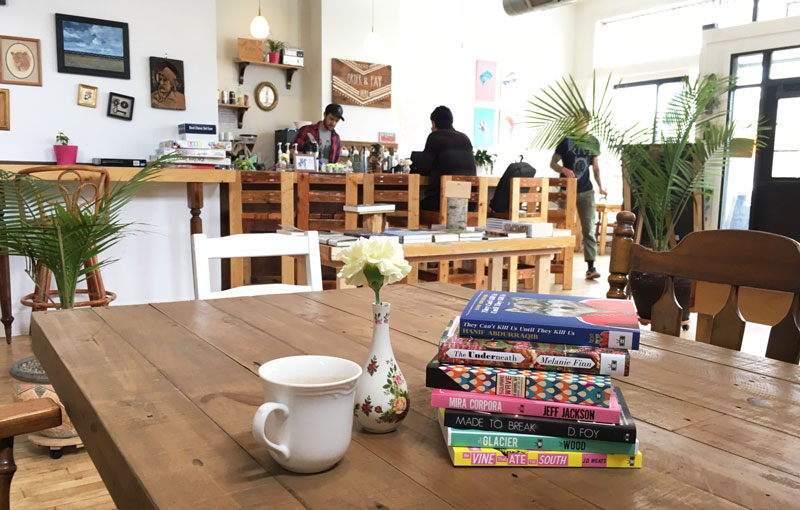- Publisher : Fitzcarraldo Editions (April 20, 2021)
- Language : English
- Paperback : 280 pages
- ISBN-10 : 1913097463
- ISBN-13 : 978-1913097462
In Bolt from the Blue, Jeremy Cooper, the winner of the 2018 Fitzcarraldo Editions Novel Prize, charts the relationship between a mother and daughter over the course of thirty-odd years. In October 1985, Lynn moves down to London to enroll at Saint Martin’s School of Art, leaving her mother behind in a suburb of Birmingham. Their relationship is complicated, and their only form of contact is through the letters, postcards and emails they send each other periodically, while Lynn slowly makes her mark on the London art scene. A novel in epistolary form, Bolt from the Blue captures the waxing and waning of the mother-daughter relationship over time, achieving a rare depth of feeling with a deceptively simple literary form.
Review
‘A novel written in epistolary form, Cooper has maximised the potential of this literary convention to achieve a work of great depth and quiet power. Over three decades, a mother and her artist daughter communicate only by letters, excavating their relationship as it evolves with melancholic, astute precision. At times spellbinding and mesmerising, the work also proves provocative and inspirational. As much a love letter to the lost art of letter-writing as it is a thirty year-long dialogue of familial love, Cooper has produced an understated book that nonetheless resonates powerfully. This book is deeply sensitive to the ebb and flow of relationships over time and the way love is disguised, expressed and experienced, and it achieves that elusive dream of all authors and finds new meaning in the recording of life.’
― Helen Cullen, Irish Times
‘Bolt from the Blue is a venturesome, epistolary fiction spanning over 30 years.’
― Catherine Taylor, Financial Times
‘A novel in epistolary form, the writer and art historian’s latest work is both an intimate account of a mother-daughter relationship and a lively history of London’s art scene. It is October 1985 when Lynn moves to the capital to study at Saint Martin’s, later making a successful career as an artist. She and her mother, who is back at home in Birmingham, begin a 30-year-long written relationship – via letters, postcards and emails. Their contact is irregular, and by turns affectionate and combative, making the relationship feel engrossing, deep and utterly true.’
― New Statesman
‘The chief pleasures of the novel, for me, were its gentleness and light, skipping pace. Cooper casts human flaws as tender foibles, and moves the reader along quickly through the years, all while exploring large themes of familial estrangement, class division, ruthlessness, and loneliness. And there is no heavy, lyrical prose here. These themes come in unspoken hints, buried within chatty updates and loaded postcard choices...Despite its arty conceptual trapping, Bolt from the Blue has the texture of actual personal relations. As a result the mother-daughter relationship feels frustrating, understandable, funny, tragic, and very close to real.’
― Suki Ferguson, Mechanics' Institute Review
‘Layers upon layers of “fictioning” make Bolt from the Blue a nuanced and beautifully textured novel. Cooper’s text takes on a mercurial uncertainty, blurring the boundaries between author and subject, person and persona, and truth and falsehood. Versions of people and narratives emerge and re-emerge, coming together to present an incomplete image of how a relationship unfolds through time.’
― Anna Souter, Burlington Contemporary
‘The book becomes deeply intimate thanks to the two women’s distinctive voices and the effect of three decades upon their dynamic. The result is a memorable portrait of difficult love, and a captivating tour of the London art scene.’
― Publisher's Weekly
‘Jeremy Cooper’s work is consistently haunting and layered, built on a refreshing trust in the reader to delve deeper behind the quiet insinuations of his prose. His work resists every modern accelerant, creating a patient and precise tonic. He is easily one of the most thoughtful British fiction writers working today.’
― Adam Scovell, author of How Pale the Winter Has Made Us
‘Bolt from the Blue is a scintillating, wistful exploration of a good career and a poor relationship. Pithy yet expansive, it’s an essential, engrossing, illuminating read for any aspiring artist.’
― Sara Baume, author of Handiwork
‘There’s a strange magic to Jeremy Cooper’s writing. The way he puts words together creates an incantatory effect. Reading him is to be spellbound, then. I have no idea how he does it, only that I am seduced.’
― Ben Myers, author of The Offing
‘For a book that has the word “love” on almost every page, Bolt from the Blue is endlessly inventive in showing us how love is often hidden, rationed, coded and disguised. It is an epistolary dialogue between a life of possibilities – as shown through the maturing vision of an artist – and one of disappointments, expressed through the wise and seasoned scepticism of the artist’s mother. Jeremy Cooper is a deft and sensitive writer who understands how to entrust his book to his characters.’
― Ronan Hession, author of Leonard and Hungary Paul
Review
‘A disarming and gorgeously rendered portrait of interiority ... The novel’s genius lies in what goes unsaid, and in the gaps between entries – what the narrator keeps from readers is the most haunting plot of all. This meandering novel is one of quiet beauty, and brief flashes of joy among seasons of despair. A study in how writing can give lives meaning, and in how it can fail to be enough to keep one afloat, this is a rare, delicate book, teeming with the stuff of real life.’
― Publishers Weekly, starred review
‘Very moving, beautiful and so thoughtful too – a wonderful evocation of animals and birds, sky and Somerset.’
― Kate Mosse, author of Labyrinth
‘What Cooper offers, very boldly and successfully, is a broad narrative arc of collapse and tentative recovery, in which a struggle for meaning and purpose in life assumes a desperate intensity. ... Because of the narrator's inability to describe his anguish, what's mostly written here is not his pain, but his clinging to life: the beauty caught and traced, with great skill, in trying to overcome suffering. In its journal form, Ash Before Oak salvages detritus, the unremarkable mess, banality and repetition of the everyday, just as the narrator works on restoring his dilapidated buildings in Somerset. And in a larger way, too, with admirable wisdom and precision, it salvages, from agonizing, ruinous thoughts and experiences, something transcendent, of lasting value.’
― Jerome Boyd Maunsell, Times Literary Supplement
‘Low-key and understated, this beautiful book ... is a civilised and melancholy document that slowly progresses towards a sense of enduring, going onwards, and even new life. It feels like a healing experience.’
― Phil Baker, The Sunday Times
‘Not only does Ash Before Oakcontain some of the most immersive nature writing I’ve seen committed to the page, it is also one of the most moving and emotionally wrenching books I’ve read in years. ... The flora and fauna, the daily repetitions and observed rituals of the simple life are documented in keen detail, and with some beautiful turns of phrase. But what on the surface sounds like the pursuit of a post-pastoral idyll actually peels back to reveal the inner workings of a fragile and unravelling mind as it descends towards darkness over a two year period. It’s a book with a thin skin.’
―Ben Myers, Caught by the River
About the Author
Jeremy Cooper is a writer, journalist, and broadcaster who has written and published widely on art and antiques. He has appeared regularly on BBC’s Antiques Roadshow, was co-presenter of Radio 4’s The Week’s Antiques, and is the author of five novels and several works of non-fiction on art and design. He won the 2018 Fitzcarraldo Editions Novel Prize for Ash before Oak.






